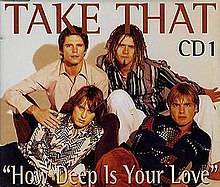
The Bee Gees were a musical group formed in 1958 by brothers Barry, Robin, and Maurice Gibb. The trio were especially successful in popular music in the late 1960s and early 1970s, and later as prominent performers in the disco music era in the mid-to-late 1970s.

"Night Fever" is a song written and performed by the Bee Gees. It first appeared on the soundtrack to Saturday Night Fever on RSO Records. Producer Robert Stigwood wanted to call the film Saturday Night, but singer Robin Gibb expressed hesitation at the title. Stigwood liked the title Night Fever but was wary of marketing a movie with that name. The song bounded up the Billboard charts while the Bee Gees’ two previous hits from Saturday Night Fever soundtrack were still in the top ten. The record debuted on the Billboard Hot 100 Chart at #76, then leaped up 44 positions to #32. It then moved: 32–17–8–5–2–1. It remained at #1 for eight weeks, and ultimately spent 13 weeks in the top 10. For the first five weeks that "Night Fever" was at #1, "Stayin' Alive" was at #2. Also, for one week in March, Bee Gees related songs held five of the top positions on the Hot 100 chart, and four of the top five positions, with "Night Fever" at the top of the list. The B-side of "Night Fever" was a live version of "Down the Road" taken from the Bee Gees 1977 album, Here at Last... Bee Gees... Live.

"Stayin' Alive" is a song written and performed by the Bee Gees from the Saturday Night Fever motion picture soundtrack. The song was released in December 1977 by RSO Records as the second single from the Saturday Night Fever soundtrack. The band co-produced the song with Albhy Galuten and Karl Richardson. It is one of the Bee Gees' signature songs. In 2004, "Stayin' Alive" was placed at No. 189 by Rolling Stone on their list of the 500 Greatest Songs of All Time. The 2021 updated Rolling Stone list of 500 Greatest Songs placed "Stayin' Alive" at No. 99. In 2004, it ranked No. 9 on AFI's 100 Years...100 Songs survey of top tunes in American cinema. In a UK television poll on ITV in December 2011 it was voted fifth in The Nation's Favourite Bee Gees Song.
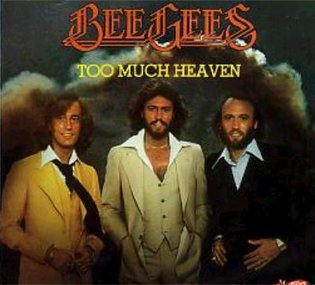
"Too Much Heaven" is a song by the Bee Gees, which was the band's contribution to the "Music for UNICEF" fund. They performed it at the Music for UNICEF Concert on 9 January 1979. The song later found its way to the group's thirteenth original album, Spirits Having Flown. It hit No. 1 in both the US and Canada. In the United States, the song was the first single out of three from the album to interrupt a song's stay at #1. "Too Much Heaven" knocked "Le Freak" off the top spot for two weeks before "Le Freak" returned to #1 again. "Too Much Heaven" also rose to the top three in the UK. In the US, it would become the fourth of six consecutive No. 1s, equalling the record set by Bing Crosby, Elvis Presley, and the Beatles for the most consecutive No. 1 songs. The six Bee Gee songs are "How Deep Is Your Love", "Stayin' Alive", "Night Fever", "Too Much Heaven", "Tragedy" and "Love You Inside Out". The songs spanned the years of 1977, 1978 and 1979.

"Love You Inside Out" is a 1979 hit single by the Bee Gees from their album, Spirits Having Flown. It was their last chart-topping single on the Billboard Hot 100, interrupting Donna Summer's "Hot Stuff", becoming the third single from the album to do so. In the UK, the single peaked at No. 13 for two weeks. It was the ninth and final number-one hit for the Bee Gees in the US, and the twelfth and final number-one hit in Canada as well. The trio would not return to the top 10 for ten years, with the song, "One".
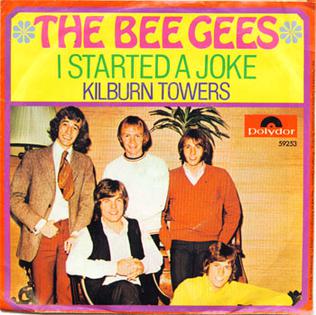
"I Started a Joke" is a song by the Bee Gees from their 1968 album Idea, which was released as a single in December of that year. It was not released as a single in the United Kingdom, where buyers who could not afford the album had to content themselves with a Polydor version by Heath Hampstead. This is the last Bee Gees single to feature Vince Melouney's guitar work, as he left the band in early December after this song was released as a single.
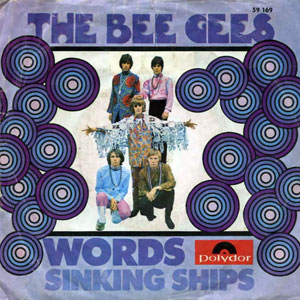
"Words" is a song by the Bee Gees, written by Barry, Robin and Maurice Gibb. The song reached No. 1 in Germany, Canada, Switzerland, and the Netherlands.

"You Win Again" is a song written by Barry, Robin and Maurice Gibb and performed by the Bee Gees. The song was produced by the brothers, Arif Mardin and Brian Tench. It was released as the first single on 7 September 1987 by Warner Records, from their seventeenth studio album E.S.P. (1987). It was also their first single released from the record label. The song marked the start of the group's comeback, becoming a No. 1 hit in many European countries, including topping the UK Singles Chart—their first to do so in over eight years—and making them the first group to score a UK No. 1 hit in each of three decades: the 1960s, 1970s, and 1980s.
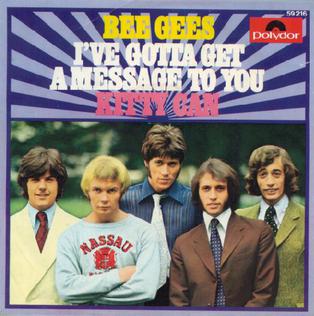
"I've Gotta Get a Message to You" is a song by the Bee Gees. Released as a single in 1968, it was their second number-one hit in the UK Singles Chart, and their first US Top 10 hit. Barry Gibb re-recorded the song with Keith Urban for his 2021 album Greenfields.

"How Can You Mend a Broken Heart" is a song released by the Bee Gees in 1971. It was written by Barry and Robin Gibb and was the first single on the group's 1971 album Trafalgar. It was their first US No. 1 single and also reached No. 1 in Cashbox magazine for two weeks.
"If I Can't Have You" is a disco song written by the Bee Gees in 1977. The song initially appeared on the Saturday Night Fever soundtrack in a version by Yvonne Elliman, released in November 1977. The Bee Gees' own version appeared a month later as the B-side of "Stayin' Alive".

"(Love Is) Thicker Than Water" is a song performed by Andy Gibb, released in September 1977 as the second and final single from his debut album, Flowing Rivers. The song was his second single that topped the US Billboard Hot 100. It was mainly written by Barry Gibb, with help from Andy Gibb. The B-side of this song was "Words and Music" in the US, but "Flowing Rivers" in the UK. It became a gold record.
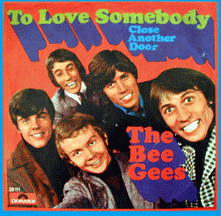
"To Love Somebody" is a song written by Barry and Robin Gibb. Produced by Robert Stigwood, it was the second single released by the Bee Gees from their international debut album, Bee Gees 1st, in 1967. The single reached No. 17 in the United States and No. 41 in the United Kingdom. The song's B-side was "Close Another Door". The single was reissued in 1980 on RSO Records with "How Can You Mend a Broken Heart" as its flipside. The song ranked at number 94 on NME magazine's "100 Best Tracks of the Sixties". It was a minor hit in the UK and France. It reached the top 20 in the US. It reached the top 10 in Canada.

"First of May" is a song by the Bee Gees with lead vocals by Barry Gibb, released as a single from their 1969 double album Odessa. Its B-side was "Lamplight". It also featured as the B-side of "Melody Fair" when that song was released as a single in the Far East in 1971 as well as in 1976 and 1980 on RSO Records. It was the first Bee Gees single to be released after lead guitarist Vince Melouney had left the group.

"I Just Want to Be Your Everything" is a song recorded by Andy Gibb, initially released in April 1977 as the first single from his debut album Flowing Rivers. It reached number 1 on the Billboard Hot 100 for three weeks, starting on the week ending 30 July 1977, and again for the week ending 17 September 1977. It was Gibb's first single released in the United Kingdom and United States. His previous single, "Words and Music" was only released in Australia. It is ranked number 26 on Billboard's 55th anniversary All Time Top 100.

"Mr. Natural" is a song by the Bee Gees, written by Barry and Robin Gibb. On 29 March 1974, it was released as a single and also released on the album of the same name in 1974. It was backed with a folk rock number "It Doesn't Matter Much to Me". The group's first single which was produced by Arif Mardin.

"My World" is a 1972 single released by the Bee Gees. It was originally released as a non-album single on 14 January 1972 worldwide. but was later included on the compilation Best of Bee Gees, Volume 2 in 1973. The flip side of the single was "On Time", a country rock number composed by Maurice Gibb. "My World" reached the Top 20 in both US and UK.

"Run to Me" is a song by the Bee Gees, the lead single from the group's album To Whom It May Concern (1972). The song reached the UK Top 10 and the US Top 20.

"Fanny (Be Tender with My Love)" is a song written and performed by the Bee Gees for their Main Course album in 1975. It was the third single release from the album, peaking at number 12 on the United States Billboard Hot 100 and number two in Canada. According to Maurice Gibb, producer Quincy Jones called "Fanny" one of his favorite R&B songs of all time.

"(Our Love) Don't Throw It All Away" is a song penned by Barry Gibb and Blue Weaver and recorded by the Bee Gees in 1977 on the Saturday Night Fever sessions but was not released until Bee Gees Greatest (1979). A different version was released in September 1978 as the third single by Andy Gibb from his second studio album Shadow Dancing.


